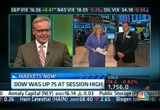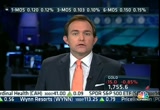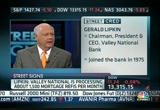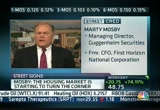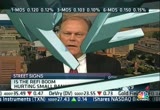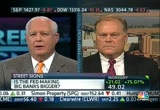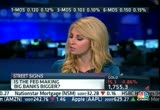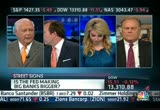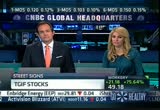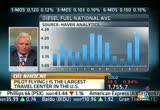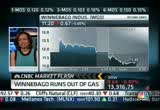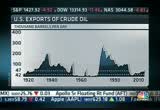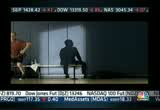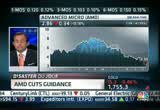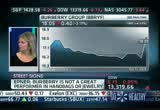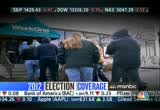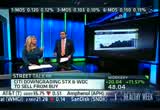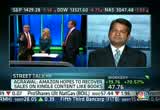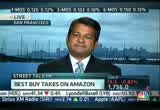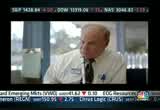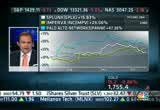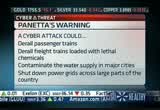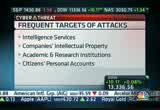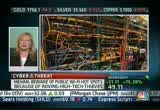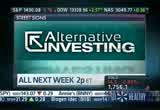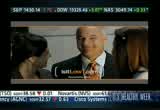tv Street Signs CNBC October 12, 2012 2:00pm-3:00pm EDT
2:00 pm
over that one. >> i bet she did! >> we'll see next week. we've still o got a long week, a lot of earnings. >> and big debate next week as well. sue, have a great weekend. we'll see you next week. that's owl for "power lunch," everybody. thanks for watching. >> have a great weekend. "street signs" begins right now. ♪ the fed is giving nearly free money to the biggest banks. how can your location banker compete? we are going to ask one. amazon admits it is basically giving away the kindle. genius move or bound to fail? plus, government scare tactics, or are we really close to getting a pearl harbor like cyber attack? an incredible video of a multi-million dollar racing yacht taking a header, mandy. happy friday, everybody. we are closing in on a perfect
2:01 pm
week for the dow but not really the way that most investors would like. the dow has not gained in any session this week and it has lost an early 75-point gain today. as for the s&p 500, it is also down today but it has the distinction of having this week's only positive session for any of the major averages. a gain yesterday of all of a quarter point. jpmorgan and wells fargo both moving lower today, though both reported earnings lower than wall street estimates. we'll dig more into that in a second. i think we have an election coming up or something with these volumes. their strong earnings were thanks to all the government backed mortgage and re-fi business brought on by low interest rates courtesy of ben bernanke and the fed. in other words, taxpayers are helping some of the big banks get even bigger. so, where does that leave the littler guy? let us ask jerry lipkin, ceo of valley national bank and marty
2:02 pm
moeshe moser at guggenheim. the four biggest banks are bigger now than pre-financial crisis. the fed is printing money, they're printing re-fis which is just increase profit. where does that leave you? >> in a squeeze. the net interest margins are coming down for most banks, particularly most community banks. >> but your basic measure of profitability. >> right. that's the difference between what we charge our clients and what we pay the depositors for the money that we're lending them. that's our net interest income. that's generally what drives the bank. >> can you compete in this environment? >> it is very difficult to make money in this environment because -- on a net interest margin basis. that doesn't mean that the banks should be asleep at the switch. we have recognized the pressures that are being placed on us by our net interest margin, and accordingly, we have started to increase our fee income business, which in our case is our residential mortgage
2:03 pm
business, particularly the refinance activity. >> certainly as we've just heard from gerry, it is so important these days to get business from re-fis and mortgages because obviously those low interest rates are hurting so many other areas of revenue for banks. is this across the board or are some banks doing this better than others? >> well, what we would think is that the larger mortgage franchises will be able to enjoy increased market share. as you see the refinancing activity picking up. some of the larger banks like wells fargo or jpmorgan that we saw announce earnings today get the benefit of being able to originate more and do get that gain in to their fee income side. which helps to balance out the revenues while they're losing some of their net interest margin to the low interest rate environment. >> how much of your problem is due to overregulation? >> a lot of it from overregulation as i mentioned to you in the past. our regulatory expense today runs us between $40 million and
2:04 pm
$50 million annually. more than it did ten years ago. that's not our total cost. that's just the increase in our total cost. it's created a lot of pressure, but as i say, the shareholders don't place management in the bank to sit there and wring their hands and say the world is coming to an end, we're under pressure with net interest margin, we've got do something else. >> as much as you are seeing a re-fi boom -- i believe that your loan mortgage business is about 90% re-fis, right? because of regulation, that processing time is what? double or more? >> a lot of it is volume and a lot of it is reler to imposed. for example, when we approve a residential mortgage, re-fi or otherwise, within five days -- i believe five or seven days of closing we must reverify the employment of the borrower. that just adds to the time and adds to the cost. but as i say, we have taken advantage of the re-fi boom. we are producing -- we went from
2:05 pm
roughly 100 mortgage applications couple years ago per month to where we're now doing 1,500 mortgage applications a month. >> you know, marty, here's the point though to me, is this -- we hear from the white house that the big banks brought down the economy. they needed to be more regulated. and that we need to shrink them. okay? but yet the fed policies are doing just the opposite. >> they're not really increasing. a lot of these assets kind of get flown out throughout the market and they're securitized. it is not as if they're really shifting assets from one bank to another. it is really just churning over assets already on the balance sheets, in servicing portfolios, then being able to create some fee income out of that. >> marty, as a percentage of total bank assets, the big four are bigger now than they were pre-crisis. >> right. some of that is just parking deposits when you start looking
2:06 pm
at the deposit inflows, they've been more influential in some of the larger banks because of some of the corporate area and commercial area. so it isn't really loan growth. it's better at the large banks versus small banks. it is really you have a little bit more of that commercial deposit balance that's inflating the balance sheet to this point. >> except for the fact that the refinancing that's taking place is sucking a lot of the assets out of the investment portfolios of banks, particularly the smaller banks who held mortgage-backed investment securities who are now having those securities prepay and those funds are being relent by the larger banks, in our case we're fortunate to be part of that, valley national is doing a big volume of that. but, the movement is from one institution to another. particularly if they're selling them to the -- to fannie or freddie. >> we would say that if you look at the large cap banks, even
2:07 pm
wells fargo or what we saw with jpmorgan, they had a very similar repricing and impant on their margin as they had those maturities coming through and refinancings hitting their securities portfolio as well. it's just that the balance -- like you're mentioning, gives them a little bit more fee income so then they can benefit while this is happening being able to offset some of the weakness on the other side of the coin which is net interest income. >> gerry, while we might be arguing whether or not the fed is actually making the big banks even bigger, ultimately do you feel that the goal is to make the current number of banks here in the united states, which runs in the thousands, down maybe to like a few hundred? >> absolutely. i believe very strongly that it is one of the goals of the government to regulate not the 7,000 banks that exist today, but to probably bring that number down to below 1,000. >> realistic? >> realistic. i think it is going to happen. people are talking about the consolidation that's going to take place, that's expected to take place. i believe it will take place.
2:08 pm
>> from an actionable investor point of view, marty, how do you act on that? >> well, i think what you do is you look for those banks that have capital, that can use that capital to go out and increase their franchise. and the reach and scope of their geography. so as you're seeing these banks that have the strength, they're coming out o of this recession and financial crisis, built their capital positions, they can then take advantage of these opportunistic acquisitions that come available and can grow the franchise in the future. >> popularity and gerry, thank you very much. have a great weekend. okay. a market flash now with bertha coombs. >> this is a bank story as well. rbs and santander had reached a deal over two years ago for santander to take over 318 branches from rbs. this was something mandated by the ec for rbs to basically unload some of these assets as part of their rescues. that deal has now collapsed according to sources who are talking to the "financial times"
2:09 pm
and dow jones. both of them reporting that. that deal had been valued at $1.65 billion. certainly the difficulties in spain and for spanish banks weighing on this situation. back to you guys. >> bertha, that was a deal of one plus one equaling about one-half. thank you. coming up, this chairman of the largest truck stop chain in america will tell you if high diesel prices are going to start to trickle down to your wallets. and then a little later on, tgif. we have some friday stock stats that will make were your brain explode. also, the post office seems to have a very different definition for "forever." chances are, you're not made of money, so don't overpay for motorcycle insurance.
2:10 pm
geico, see how much you could save. with the fidelity stock screener, you can try strategies from independent experts and see what criteria they use. such as a 5% yield on dividend-paying stocks. then you can customize the strategies and narrow down to exactly those stocks you want to follow. i'm mark allen of fidelity investments. the expert strategies feature is one more innovative reason serious investors are choosing fidelity. now get 200 free trades when you open an account.
2:12 pm
okay. let's ring in the weekend just a little bit early with some tgi friday stocks. big winner here, up the front, ibm. 67% of fridays this year this stock has gained. home depot which is up by 1% today. we've also got walmart, ge, part owner of nbc universal for disclosure purposes. rounding it all out, exxon-mobil bucking its trend of up fridays. still closing higher, 62% of fridays so far in 2012. well, exelon
2:13 pm
. chairman of pilot flying j, the biggest operator of travel centers in north america. he is also the new owner of the cleveland browns, by the way. thank you very much for joining us. diesel crisis remains high. how much is this going to trickle down through the rest of the economy? >> you know, we think it is already having an effect, brian. i just returned, your timing for this is perfect. i just returned from the american trucking association meeting in las vegas. i was talking to all our trucking company customers. it was a pretty somber group of individuals we were talking to. we were talking to individuals who ran trucking companies who had 15,000 trucks all the way down to guys who had 100 trucks. it's not as bad as '08. the last couple of months have really softened up in the truck load sector which tells us that retail, manufacturing, et cetera, are also softening up. >> who do they plablame, jimmy? >> i don't know if they blame anyone. they're like us, just trying to work hard to get the best return
2:14 pm
on their investment that they can in their companies. i think there is great dissatisfaction about the uncertainty in washington. but these aren't guys that blame things. they're just trying to figure out how to structure their company to be successful in the future. but there was more concern, brian, than i have seen -- this is an annual meeting -- all the way back to '08. >> are they power less to do anything about it? >> well, you know, good businessmen are always trying to react. the emphasis now, candidly, is on controlling costs so they're working real hard to control the costs out of their business, just like all prudent business people do during tough times. >> do higher fuel prices really steal money from the other parts of your stores or do people just spend more overall? >> no, they definitely do. i'll walk you through this year. that's a great question you asked. first six months of the year the sales in our trucks stops and travel centers were actually very good. we were very happen. july softened up a little bit so we had mild concern. august, september and the first part of october have been much softer.
2:15 pm
if you'll think about it, gasoline bottomed out on the new york mercantile exchange at about $2.52 on -- i think it was june 26. since then it's gone up almost 80 cents. you take the typical person who buys 12 gallons a week, that's almost $10. that person probably doesn't have $10 extra so they've either got to drive less and/or buy less in the stores and that's what you're seeing show up. >> jimmy, if you don't mind, i'm going to jump in as well. this is plandy. earlier on this week we were struck by a story that because of particularly high gas prices in the state of california, there was a rise of gasoline thieves, basically people coming up, disabling the meter, siphoning off the gasoline and running off and this is obviously really easing into profits and gas stations across the country. is this something you've seen or heard of anecdotally amongst your friends? >> no, we really haven't, mandy. there is devices can you put on the pumps to make it almost impossible to jam them. we saw a similar run-up in
2:16 pm
california. the reality is, in california, you have to sell carved gasoline. that's a gasoline that has a different spec than any other gas in the country. when they have a problem, there's only four refineries in california. when there is a problem with one refinery, they can't bring product in from arizona or from nevada or oregon or wherever. it is a little island out there by itself so the prices literally ran up $1.50. refinery's come back up, i think you'll see prices start to come down fairly quickly in california. >> you guaranteeing victory against the bengals this weekend? >> we need a victory badly. we'll take a one-point win. we obviously spent our first round draft pick, he's a great guy working hard, he's learning. by like all rookie quarterbacks he's got a ways to go. hopefully he'll have a big game on sunday. >> you already sound like an nfl
2:17 pm
owner, jimmy. >> you should know, of all people, there was no such thing as a guarantee when it comes to sports. >> trying to help my fantasy team. >> thanks for having us on. we appreciate it. speaking of driving, bertha has a market flash on winnebago. >> winnebago today looks like it is over in the ditch actually. shares are down after yesterday we saw a little bit of a letdown. baird today saying they think things are getting better. recent rv shows have showed enthusiasm. they're producing more. but shares are now up about 50% year to date and they think a lot of that has been priced in. certainly investors seem to think so today. looks like it is going to the lows of the session here at this hour. oil traders getting awfully excited about a possible break-through in exporting. that is right. exporting american oil. kate kelly joining us now. kate, you and i were just chatting, some people are saying that this story could get a lot bigger than it even is now. >> absolutely.
2:18 pm
it's already been compared to the keystone-xl debate. some of the oil traders are buzzing about the news today that the u.s. government has issued at least a couple of new licenses to export american crude. a practice generally prohibited under the law with a few exceptions -- to canada. for decades the u.s. has banned nearly all exports of american crude with just a few things where you can do it. -- when you're putting it by rail over the border into canada, when you're shipping it to canada. as a result, the proportion of u.s. crude that's exported is a pittance, less than 100,000 barrels per day compared to the 9 million that we import. but now it appears that several international oil companies -- bp, shell and vitale as well, will soon export to canada. at least one other foreign oil traders was granted to license last year and i'm told there may be more to come. the desire to export more crude is a direct result of the oil rush occurring at home where imports have fallen 33% in
2:19 pm
recent years. if the ban on crude exports is relaxed, it could be a very bullish for wti crude prices which have sagged this year compared to the world benchmark which is brent. this past summer in fact the volume of brent futures traded exceeded that for the first time that of wti for the first time. oil isn't moving that much today on export news, but if this policy really is relaxed, you may want to take those short trades off. >> how much opposition is there to relaxing this policy? >> first it comes at such a politically sensitive time. this is kind after normal thing. you're allowed to do this if you're using trains or ships to go to canada specifically. is kind of normal but the number of licenses being sought and granted right now is a little bit unusual, a result of supply and for the white house, this is not a great headline. you may recall that they battled over the key zone excel pipeline which would help release the bottle neck in oklahoma and make
2:20 pm
drive up prices of wti a little bit as we export them to the gulf but that continues to be a hot issue. that pipeline is being constructed in sort of a partial form, and darryl hannah, the actress, was just arrested over the weekend i think in dallas demonstrating, laying in front of heavy machinery to oppose the construction. she and a 78-year-old great grandmother were taken to jail as a result of this. >> is that so. >> it's true. >> little extreme. >> well, it is a hot issue, brian. but this is the kind of thing, it is normal under the law since 1975. but again, the volume here and level of interest this is getting today, timing could make it significant. >> we should export it all so gas would go to $10 a gallon. >> then maybe we'd have more of an energy policy. >> or "an" energy policy. >> which i think might be a direct quote from boone pickens. it is going to cost more to mail a letter here in the states. u.s. postal service is expected
2:21 pm
to lose a record $15 billion this year and it is going to try to make back its money one penny at a time. the postal service will raise postage rates on january 27th next year, including a one-cent increase in the cost of first class mail to 46 cents. it will also introduce a new global forever stamp allowing customers, such as myself, to mail letters anywhere in the world for a price of $1.10. the post office cannot legally raise prices more than the raft rate of inflation or 2.6 cents per year so it's asked congress to give it new authority to raise stamp prices by 5%. i think the house has yet to act. luxury is losing its luster. high-end retailers are getting whacked. we ask, is this the beginning of big trouble? then there's this. the story behind the most awesome video of the week. [ horn honks ] hey, it's sandra -- from accounting.
2:22 pm
peter. i can see that you're busy... but you were gonna help us crunch the numbers for accounts receivable today. i mean i know that this is important. well, both are important. let's be clear. they are but this is important too. [ man ] the receivables. [ male announcer ] michelin knows it's better for xerox to help manage their finance processing. so they can focus on keeping the world moving. with xerox, you're ready for real business. c'mon, michael! get in the game! [ male announcer ] don't have the hops for hoops with your buddies? lost your appetite for romance? and your mood is on its way down. you might not just be getting older. you might have a treatable condition called low testosterone or low t. millions of men, forty-five or older, may have low t. so talk to your doctor about low t. hey, michael! [ male announcer ] and step out of the shadows. hi! how are you? [ male announcer ] learn more at isitlowt.com. [ laughs ] hey!
2:24 pm
♪ ♪ introducing a stunning work of technology. ♪ introducing the entirely new lexus es. and the first ever es hybrid. this is the pursuit of perfection. check that out. amazing video. team oracle cap sidsizing last during a world cup series last week in san francisco bay. no one was hurt. boat was a little bit banged up.
2:25 pm
the nephew of oracle founder larry ellison was one of those dudes hanging around. right there. incredible video. >> literally hanging around. today's sunshine stock nps pharmaceuticals after the fda issued an upbeat preview of its short bowel syndrome drug. >> the disaster dujour -- amd the chipmaker cutting fiscal third quarter revenue guidance saying sales have dropped 10% from the prior quarter because of weaker than expected demand, also cutting its gross margin forecast by about 1% n4% year t date. over the past four weeks, all luxury retail stocks that we found were underperforming the dow. the question is, is luxury over. let's hope not! i like a little luxury. is luxury over?
2:26 pm
>> no, it's not. there's still great categories going on. unfortunately, burberry is not in all of those. we see strength in fashion jewelry, fashion watches, handbags, shoes, and other accessories like that. all the ones that burberry is not exsellicelling in right now. >> maybe a company-specific issue? >> yes, it is self-inflicted. i would not count the brand out by any stretch of the imagination. it is an iconic brand. they will come back and in fact in the past five years they've been at the forefront of the luxury sector and they've been ahead of digital media, supply chain, and universal point of view. so they just have some hiccups here. for fourth quarter, their main driver is outerwear so they can easily come back. >> you've got the perfect job.
2:27 pm
you go in to these luxury retailers -- >> you busted me. >> where are you seeing demand? i know you can't do buy, hold, et cetera right now. >> we don't do that. >> but where are you seeing strength in the high end? >> right now again it is cosmetics, fragrances, handbags and fashion watches or luxury watches and fashion jewelry. those are the biggest areas right now that continue to perform. not only in luxury but trickling down. >> i was going to ask you. this varying shades of luxury, right? obviously there's louis vuittons, then coach, but which end is doing best? >> it is hard to put them all into a category because i cannot say the coach category is suffering. right now in the example of coach, they've been dominant in the $300 to $500 price points in handbags for the past ten years. >> very aspirational products
2:28 pm
for the middle class. >> then. then in the last few years, michael kors blazining on the scene, tory burch. >> china is slowing down. >> we don't do any secret shopping in china. we do hear some information and right now there has been a slowdown from some of the contacts that we have. we cannot speak asp intelligently as we do in the u.s. about that. >> mary, fantastic to have you on the show. >> thanks for having me. up next, amazon.com founder jeff basos mafking a big admission about the kindle. >> could it be time to tap the strategic apple reserves? yes, there is such a time. we'll head to one of the biggest orchards to talk about the coming apple crisis. tdd#: 1-800-345-2550 this morning, i'm going to trade in hong kong.
2:29 pm
tdd#: 1-800-345-2550 after that, it's on to germany. tdd#: 1-800-345-2550 then tonight, i'm trading 9500 miles away in japan. tdd#: 1-800-345-2550 with the new global account from schwab, tdd#: 1-800-345-2550 i hunt down opportunities around the world tdd#: 1-800-345-2550 as if i'm right there. tdd#: 1-800-345-2550 and i'm in total control because i can trade tdd#: 1-800-345-2550 directly online in 12 markets in their local currencies. tdd#: 1-800-345-2550 i use their global research to get an edge. tdd#: 1-800-345-2550 their equity ratings show me how schwab tdd#: 1-800-345-2550 rates specific foreign stocks tdd#: 1-800-345-2550 based on things like fundamentals, momentum and risk. tdd#: 1-800-345-2550 and i also have access to independent
2:30 pm
tdd#: 1-800-345-2550 firms like ned davis research tdd#: 1-800-345-2550 and economist intelligence unit. tdd#: 1-800-345-2550 plus, i can talk to their global specialists 24/7. tdd#: 1-800-345-2550 and trade in my global account commission-free tdd#: 1-800-345-2550 through march 2013. tdd#: 1-800-345-2550 best part... no jet lag. tdd#: 1-800-345-2550 call 1-800-790-3801 tdd#: 1-800-345-2550 and a global specialist tdd#: 1-800-345-2550 will help you get started today.
2:31 pm
2:32 pm
price target to $88. they see another $12 and change of upside here. saying it is gaining more footing in the turnaround story. i think there will be an eps revision higher. they note walmart's international operations continue to improve. so multi-faceted upgrade there on walmart from jeffries. let's look at what's happening with europe's largest semiconductor maker. >> that stock's up 7%. the stock is rising on a report or reports that it may split itself up before the end of the year. in fact, the "san francisco chronicle" citing people familiar with that situation on that report. though they put out a bizarre statement saying they deny the existence of initiatives which can compromise unity of the company. >> whatever that means. >> exactly. they are european so maybe something was lost in translation.
2:33 pm
still people are buying into it, up 7%. linkedin. this is kind of a little bit of a strange one today because the stock is down despite the fact that we got an upgrade. >> evercore not helping this name. they upgraded linkedin to an overweight rating. productivity enhancement tool called sales navigator. they see that driving longer term revenue growth through linkedin. still, it is not helping the name. but linkedin is up 35% so far year to date. >> we have a double-barreled one here, western digital and seagate technology. >> similar story here. citi group analysts lowering the hard drivemaker shares two notches to a sell. they didn't go from a buy to a neutral. they went from buy to sell. which is really unbelievable here. they see meaningful downside to the sector near term. given the further deteriorating side of the business for pcs. in other words, when we talk about dell not selling a lot of computers, well, often these disk drives are in them.
2:34 pm
citi going from a buy to sell, whacking both names. >> this amazon segment is a gift to herb greenberg. we don't see him on the show. he's all hot and bothered about this stock. >> well, jeff bezos -- i think he told the bbc -- it was british -- that basically -- herb's here! basically bezos saying we're not making any money on the kindle itself, that we want to make it all up on books, movies, et cetera. >> the razor blade concepts. issue is it will work and could work if they sell the content. but you have to keep an eye on this because it is that all-in thing we talked about. you're all in on a price? we don't know how many kindles it will take before they're all in and then they're just going to have to rely on the sale of the content. remember, there's a lot of content out there. >> there really is. let's bring in a product street gist and contributor to tech crunch. is trying to profit from the kindle entirely genius or folly?
2:35 pm
>> i think it's genius. amazon has done a good job of getting kindles into households and they're trying to get as many kindles into households as they can. this becomes a storefront not just for music an movies and tv content but it becomes a storefront for everything amazon sells. >> you know, we've kind of got a three-way going on here. you've got amazon going after netflix, best buy going after amazon, everybody's trying to price match, everyone's trying to squeeze the other one out. at end of the day, who wins? >> i think amazon clearly wins. some of the large e retailers like walmart and target i think will do okay. it is interesting to note that walmart and target have stopped selling kindles all together because they figure the competitor tleft amazon. i think best buy is a clear loser in all of this. >> rocky, if we look at this, i've been going back and forth on twitter about this today. people are pointing out to me, then i point out to others, that fries which is a big california operation, a private company, actually advertises that they
2:36 pm
actually meet internet -- or beat internet prices. can you go to the store showroom, unless as paul says you are trying to buy a computer or hard drive or some hardware, they come in with the better price. how does that fit in to this? >> it does fit in a little bit but the people in the store are already intending to buy. if the price is vastly different they'd probably walk out anyway so you are capturing a sale you wouldn't otherwise have. >> bingo, which is what best buy's trying to do. the question is quarterback best buy do it the way fry's is doing it. best buy public company, fry, private company. >> i think they can. it will just hurt their margins for certain customers. if you look at prices and lower it for everybody that walks into the door, that's a much bigger concern but they're not going to do that. they are just doing it for people who ask for the lower price. >> it is basically a survival strategy here for best buy is this. >> absolutely. they need to get people in to their stores and by having this price matching, they can get some people to continue to buy.
2:37 pm
one of the big things that's been missing with best buy, as music an movies have don digital, people aren't coming in for new releases anymore. they don't have all that foot traffic that they used to have. >> what do they have? >> that's a good question. they've got some of the services business, they've got some people who are just going to be wedded to wanting to look at things before they buy. but it's a big concern going forward that people are just going to get more and more comfortable with online content and online shopping and be able to do everything from home. >> as they told us actually, they're trying to hang on to the customers that are in the store that normally would go out. they're acknowledging that and they've acknowledged that to cnbc. but the one other thing they have on the operating margin side, 1.2% operating margins? woo! >> that's fantastic. we can end up as a nation with lots of half-empty strip malls, just filled by delivery trucks going up and down the tumb
2:38 pm
tumbleweeds rolling down main street please note my sarcasm on that. is that how we're headed, rocky? bunch of half-empty strip malls? we know that adds to the value of a neighborhood. >> we're seeing these strip malls emptying out already. we're seeing a lot of empty big box retailer spaces and i think that's going to continue. >> more room for laser tag. everything's fine. >> okay. rocky, thank you so much for joining us. herb, thanks for weighing in as well. >> spend some money locally. let's get a market flash and bertha coombs. shares of genkorth have really come back on headlines from reuters that the company is looking to maybe sell a couple of its businesses, perhaps including its wealth business citing unnamed sources. just yesterday s&p had cut its credit rating just to above junk level saying that the company lacked financial flexibility, perhaps they may be looking to change that. back to you. >> coming right off the lows there, bertha. thank you. the next time that you head to the supermarket to buy
2:39 pm
apples, you might get some serious sticker shock. >> the drought and some labor issues are creating a shortage. we'll take you to an actual apple orchard where they make iphones -- next. smart comes wi, a crash management system and the world's only tridion safety cell which can withstand over three and a half tons. small in size. big on safety. [ male announcer ] how do you turn an entrepreneur's dream... ♪
2:40 pm
into a scooter that talks to the cloud? ♪ or turn 30-million artifacts... ♪ into a high-tech masterpiece? ♪ whatever your business challenge, dell has the technology and services to help you solve it. ♪ [ male announcer ] this is karen and jeremiah. they don't know it yet, but they're gonna fall in love,
2:41 pm
get married, have a couple of kids, [ children laughing ] move to the country, and live a long, happy life together where they almost never fight about money. [ dog barks ] because right after they get married, they'll find some retirement people who are paid on salary, not commission. they'll get straightforward guidance and be able to focus on other things, like each other, which isn't rocket science. it's just common sense. from td ameritrade. with the blackish-blue frame and the white dots and the splattered paint pattern, your lights are on. what? [ male announcer ] the endlessly customizable 2013 smart.
2:42 pm
genwor coming up on the closing bell, a first on cnbc interview with the ceo of wells fargo, he'll break down the bank's earnings and tell us if he thinks the housing comeback is for real. you think mortgage rates are low? one of our guests says they should be even lower an banks are benefiting big time right now. recently oracle ceo's larry ellison told maria he'd taken on a $4 billion line of credit. well, we think we found something that's on his shopping list for that $4 billion right now. we'll get to that at the top of the hour. michelle caruso-cabrera with here with me again at the new york stock exchange. >> thanks, bill. looking forward to it. could it be time to tap the strategic apple reserves? there actually is such a thing. we might need it because last year's cold spring crushed apple crops. will there really be a shortage? co-owner of dressel farms up in
2:43 pm
new york is with us. how bad is it really up there? >> it is a gorgeous day up here, but we just haven't got much to do, unfortunately. normally we'd be picking apple furiously right now, but instead we're just kind of limping along trying to fill the storages. >> when are you going to run out of apples? >> well, we've got plenty of apples right now. we normally grow about 140,000 bushel here on our family farm here in the hudson valley of new york state. but this year we're probably only going to pick about 30,000 bush bushel. we pick them and put them in refrigerated storage and pack those between now and december. so that we'll be fine with. then the room behind me is a controlled atmosphere room where we refrigerate the apples and we also adjust the nitrogen, oxygen and carbon dioxide levels in the room, kind of put the apples to sleep and we would pack those until next june in a normal
2:44 pm
year. but this year we personally will probably be out some time in january or february. >> what else is that going to impact? we know corn, right, is in so much -- obviously you've got apple juice and apples themselves. what's this going to do to prices? what's it going to hit? >> yeah. we've seen some various prices. the most surprising as the price of fresh cider. prices for a gallon of fresh squeezed apple cider at farm markets, an increase of 15% to 20%, if not more. it is up substantially. >> i was going to ask about your employees. i believe you've got about 25 employees. i'm sure they're all relying on
2:45 pm
their paycheck. but if you run out of apples, obviously the one you put to sleep, what happens to those employees? >> right. that's a real serious problem and a real big concern of ours. the employees that we have here, about half of the employees work pack being the apples through the winter months. the other half work outside, right through the winter. pruning trees and doing other jobs right through the winter. so, yes, their family households -- most are a husband/wife combination. not all of them. a lot of the men work outside trimming the trees, pruning them through the winter. so we'll still have to do that because apples are a biannual crop. the trees are here year after year. so we will have to find a way to borrow money or whatever to pay those men to trim the trees through the winter. but you're right, the household incomes will definitely be affected. right now we're working on a shortened packing schedule. we're only packing five hours a day and we're trying to give
2:46 pm
everybody some income and stretch it out through five or six months instead of just banging right through our crop and being done in three months. so trying to help keep those families viable for their sake and for ours for next year. >> best of luck with that. thank you so much for talking with us. america may be in danger of falling victim to a cyber pearl harbor. that is not the warning from some random conspiracy theorists but a member of the president's cabinet. we'll investigate this threat, what it means for your money, next.
2:49 pm
cyber security stocks higher today after defense secretary leon panetta's warning about the risk of online attacks. three companies have had impressive runs since their recent ipos. panetta took on the cyber security issue and in strong words put corporate america and the government on notice. >> the collective result of these kinds of attacks could be a cyber pearl harbor. an attack that would cause
2:50 pm
physical destruction and the loss of life. >> let's bring in eamon javers live at pentagon. were these a little bit hyperbole? >> it was blunt talk front of a business group in new york. this message is very clearly designed to delivered to business and defense secretary panetta raised some of the worst case scenarios here. let me walk through some of the specters he raised. he's talking about a cyber attack that could derail passenger trains, freight trains loaded with lethal chemicals that could contaminate the water supplies in major cities or shut down the power grid across large parts of the country. nbc news is now reporting just today that officials here in the united states think that that recent round of denial of service attacks against american financial institutions did, in fact, come from iran. nonetheless, i talked to folks at the chamber of commerce this
2:51 pm
afternoon. they say despite what panetta said last night, they still have concerns about a piece of legislation that was proposed over the summer to help increase cooperation between the pentagon and the business community. they say their concern is that this bill that has been proposed would require -- would give federal officials too much insight and oversight into how private businesses respond to these attacks. they say they're worried about increased regulation over private companies as the pentagon tries to get its arm all the way around the potential threats to infrastructure and private businesses, guys. >> regulate more. eamon, thank you for that. so what are companies doing to keep their systems safe from cyber attacks? joining us so the vice president for cyber security at luna line. it seemed as if panetta was focusing on things that could happen on mass and potentially a national level. how much is it masking the
2:52 pm
gravity of what goes on in terms of cyber security and cyber hacking? >> well, those are difficult questions. i mean, secretary panetta was really on to something when he said we're facing serious cyber threats. we need to scope those threats properly in order to address them. i think we need to address them both at a national level. we are facing some serious threats from potential adversaries, but we also need to look at them from our industrial base as well as from each individual themselves. our industrial base from the perspective, they are our financial industry, our insurance industry, our electrical grids. they could face potential devastating attacks. we also need to look at it from the perspective that many of these organizations, particularly in the federal space, also have a significant amount of critical information. it's not just about the devastating attack that's going to bring them grinding to their knees. it is also about the amount of information that is being exfiltrated on a daily basis.
2:53 pm
>> how vulnerable are we? are we, as our awareness of this problem becomes more acute, getting safer? >> i think we are getting in some ways safer. i think the average individual is more aware of what they need to do on a daily basis to protect themselves. obviously, we need to continue that education for the individual users. i think on a national level, we are becoming also increasingly aware. but we need to look at where these attacks are coming from. secretary panetta was talking a lot about the nation's state-level attacks. i'm certainly aware we need to aggressively and proactively address those. we also need to take a look at some of the other avenues. we've seen what i call hackti s hacktivists that are less predictable and equally dangerous. then we have the cyber criminals whose entire existence rests on maintaining the infrastructure because that's what's financing
2:54 pm
their activities. >> julie, does it even matter though? i understand it's a blow to confidence, but are we so tied into the internet now that no matter what happens we're stuck? where's the real risk that americans lose confidence in the web to the point where they reduce their usage? >> you know, i don't think that's going to happen. >> so we're stuck, in other words, right? >> i think we're stuck. maybe that's not the right word to say. >> it's like living in a house that gets robbed every day. i can't move. >> we are in a house that gets robbed every day. by the same token, we're in something that provides a critical support for our infrastructure and for our daily activities. yeah, in a way we're stuck. i would agree with that. i also think that the internet is much more redundant than we give it credit for. i think that it's much more robust than we actually give it credit for. so i think we need to take that into consideration when we're looking at the threat. >> i certainly hope so. otherwise, it feels a little fatalistic. thank you for joining us on the show, julie. and riddle me this, dear
2:55 pm
viewer. which state drinks the most beer? the answer, next. and the other day we showed you how to invest in whiskey. well, all next week we're going to bring you the best alternative alternative investing ideas. not gold, not that. we're talking diamonds, cars, to owning a piece of a vineyard, even a little slice of a cow. we'll call it a slice because it's a family show. our special series starts on monday. you're going to want to check it out. got some cool stuff for you. [ male announcer ] feeling like a shadow of your former self?
2:57 pm
c'mon, michael! get in the game! [ male announcer ] don't have the hops for hoops with your buddies? lost your appetite for romance? and your mood is on its way down. you might not just be getting older. you might have a treatable condition called low testosterone or low t. millions of men, forty-five or older, may have low t. so talk to your doctor about low t. hey, michael! [ male announcer ] and step out of the shadows. hi! how are you? [ male announcer ] learn more at isitlowt.com. [ laughs ] hey! hi! how are you? hahahaha! hooohooo, hahaha! this is awesome! folks who save hundreds of dollars switching to geico sure are happy. i'd say happier than a slinky on an escalator. get happy. get geico. melons!!! oh yeah!! well that was uncalled for. folks who save hundreds of dollars switching to geico sure are happy. how happy, ronny? happier than gallagher at a farmers' market. get happy. get geico.
2:58 pm
bad news. beer drinking in america is down for the third straight year. get your act together, america. beer guzzling has fallen by as much as 11% in some states. we still drink, though. 6.3 billion gallons. that was last year alone. also, 28 gallons a year for every american of legal age. but it's been a pretty good year for beer stocks. by the way, the state with the lowest and highest per capita consumption, do you know? >> most definitely utah. >> the highest? it's surprising. new hampshire. >> it's cold. all right. we talk a lot about the deficit, the economy, jobless rates. qe-3 and cyber threats. jane wells is here with what could be the single biggest issue that could destroy america. jane. >> this is just coming into the news room. we've been researching it. it's a national epidemic.
2:59 pm
butt dialing. i've done it, you've done it. i often butt post on facebook the letter "p" several times. it's not funny when it comes to the 911 phone call centers. for every 100 calls made, 40 are action accidental. that's 100 million calls a year. cell phones are a good things because it helps report accidents and crimes more quickly. when you're butt dialing, it becomes a time waster. in some community, police have to go out and search down a silent call. the bigger the city, the bigger the problem. in new york city, 10,000 butt dial calls to 911 every day. >> what's the cost of that? got to be hundreds of millions of dollars. >> i don't know. you know what? i blame wall street fat cats and their fat fingered flash crash trading. >> all i can say is that is a
74 Views
IN COLLECTIONS
CNBC Television Archive
Television Archive  Television Archive News Search Service
Television Archive News Search Service 
Uploaded by TV Archive on

 Live Music Archive
Live Music Archive Librivox Free Audio
Librivox Free Audio Metropolitan Museum
Metropolitan Museum Cleveland Museum of Art
Cleveland Museum of Art Internet Arcade
Internet Arcade Console Living Room
Console Living Room Books to Borrow
Books to Borrow Open Library
Open Library TV News
TV News Understanding 9/11
Understanding 9/11